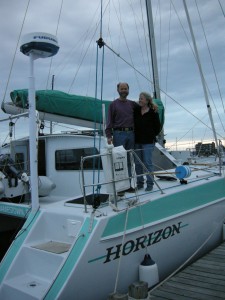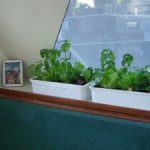
Cooking. I love it. My husband calls my cooking “weird but good.” It’s so addicting to add yet another ingredient, and yet another – especially unexpected ingredients – to any dish, and having that dish turn out well. It’s also a great mental break from being the president of Zhivago Partners.
I’ve loved cooking for years, but two events in our lives had a big effect on our culinary adventures. My husband almost died from throat cancer in 2006; they radiated his throat to pieces and gave him lots of chemo. He had a 5% chance, but he survived. Yay!
Unfortunately his salivary glands are about 10% of what they used to be. So everything I cook has a sauce component. It has made me a much better cook.
After he “made it,” we started working on the bucket list – and ended up having a 48-foot catamaran built in South Africa, and then sailed it home to New England in 2009. Life being what life always is, we didn’t leave South Africa as quickly as we thought we would; we left five months later. (The whole adventure is chronicled here.)
The bad news is, it took five months to get the boat ready for our 8,000-mile journey. The good news is, we met some wonderful people who have become life-long friends, and I was exposed to some great cooks, and completely new dishes and ingredients. It was mind-blowing.
There are so many culinary influences in Cape Town, from the Dutch to the Malaysian to, of course, the African. Amazing place. Plus, I was preparing us for two months at sea – where there is no way to “go to the store.” My goal was to eat as well at the end as we did at the beginning.
South Africa to Rhode Island

It worked, thanks in part to a micro garden that our friend Matthew gave to us before we left, and the corn-syrup-free canned fruit they sold in Cape Town (which ended up being our main salad ingredients towards the end).
In Cape Town, they prize beef with bones in it above beef without bones – so I was able to get dozens of filet roasts about the size of my forearm for a fraction of what we would pay in the States. I stuffed the small freezer on the boat with these roasts. They served us so well as we crossed the two oceans, for all sorts of dishes.

One thing I learned about my husband while feeding him through a stomach tube for 4 months during his cancer treatment was that he absolutely, positively had to eat beef. Something to do with having Type O blood, I think. So those filets really came in handy, for Mexican, Italian, Chinese, Swedish, and other types of dishes, and to keep the captain healthy and happy as we rode the waves hour after hour, day after day.